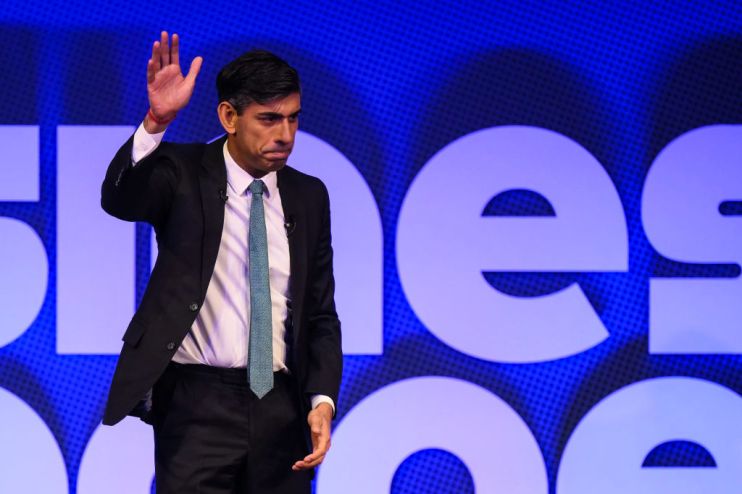Five pledges: How is Rishi Sunak doing after one year in No10?

Just 12 months ago today, Rishi Sunak made history.
Entering No10, on 25 October, 2022, he became the UK’s first British Asian and Hindu Prime Minister – and took over from his record-breaking predecessor after just 49 days.
Since then, he’s lost five by-elections; visited Ukraine, the US and Israel, and seen his personal poll ratings plummet, with half of all Brits saying he’s been a poor or terrible leader.
But a full 365 days later – or more than seven Liz Truss’s premierships – just how is Sunak doing on the five pledges he asked the country to judge him on?
We take you through the scores on the doors…
1. Halve inflation
To hit this much-vaunted goal, inflation needs to fall to 5.3 per cent before the year’s end.
And after a series of upside surprises over the summer, inflation finally looks like coming down and many economists think it will fall sharply over the coming months.
In fact, October’s reading will likely be just above five per cent thanks to the sharp decrease in Ofgem’s price cap.
Laith Khalaf, AJ Bell head of investment analysis, said while rising oil prices give “some cause for concern” Sunak is “largely there with this one, though he might as well have pledged that Man City are going to win the league for all it’s got to do with him”.
But CCHQ itself says there is “more to do” with latest figures hitting 6.7 per cent.
Given this, City A.M.’s rating remains yellow.
2. Grow the economy
The economy has grown over the course of this year, but it has seesawed between expansion and contraction.
There is a vigorous debate over whether the UK will enter recession in the coming months, as the economy struggles under the weight of the Bank of England’s interest rate hikes.
In short there is a real chance the economy will contract in the final quarter of the year.
Khalaf gave Sunak “nil points” on this one, and points out: “Politicians can exert some sway over the economic prospects of a nation, but not over the course of a year.
“As it stands, growth is still anaemic, though I suspect when the time comes he will point to the fact we’ve dodged a much anticipated recession to put a tick next to this item on his list.”
We’re keeping this one yellow for now – let’s wait and see.
3. Cut debt
The total level of debt will not be falling, but the government wants debt as a proportion of GDP to fall.
This is likely to be met thanks to upward revisions to the UK’s performance post-Covid which mean the UK is now 1.8 per cent larger than it was pre-pandemic.
But debt is still very high – perhaps even unsustainably so.
While Khalaf admits “national debt as a proportion of GDP has risen over the last year”, he stressed that Sunak will “probably point to debt being lower than forecast as a way of fudging this one”.
In a boost for Sunak, City A.M. is giving this one a yellow rating – an improvement from our August scorecard.
4. Slash NHS waiting lists
Promises to improve the NHS are often a vital offer from politicians, with middle England infuriated by the 8am scramble for GP appointments and general sense of declinism.
And tackling the post-Covid backlog will be crucial to Sunak’s increasingly slim chances in any general election.
But the latest NHS figures show waiting lists for planned treatment in England – i.e. a scheduled hip replacement operation – has increased again by 100,000 to a record high of 7.75m.
Dr Sarah Scobie, from health think tank the Nuffield Trust, warns: “If the Prime Minister’s aim is to bring down NHS waiting times to lower than when he initially made his five pledges, then success is looking increasingly out of reach.
“To meet this pledge the NHS will need to be delivering more care than before Covid but reaching this without more funding and resources is an extremely tall order.”
Realistically we can only give this one a red.
5. Stop the boats
Finally, Sunak’s perhaps most controversial promise, to stop the small boats arriving with migrants crossing the Channel.
Anand Menon, director of think tank the UK in a Changing Europe (UKICE), stresses that the success of this pledge “all hinges on” the Supreme Court’s decision over whether the government can legally deport illegal migrants to Rwanda.
“If the court strikes down the Rwanda plan then he is no closer to it than he was a year ago,” Menon told City A.M.
He added: “Progress has been made on cutting the backlog. But actually whether they have a solution to the people arriving, the jury’s out.
“Strictly speaking, deporting people to Rwanda isn’t ‘stopping the boats’ – it’s getting rid of them once the boats have landed.
“It almost sounds like a back of the envelope pledge because no one can do it – the Italian’s don’t know how to do it, the French don’t know how. We don’t know how.”
Safe to say, this one’s another red.
